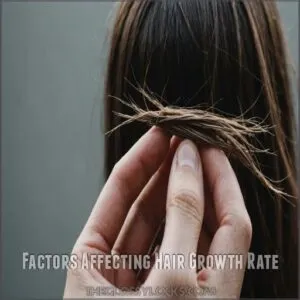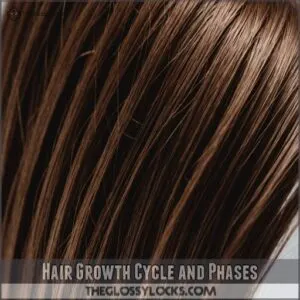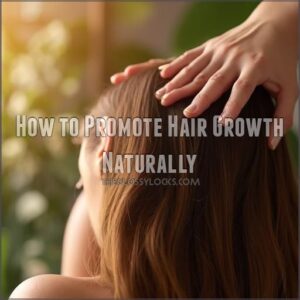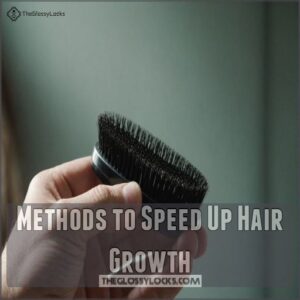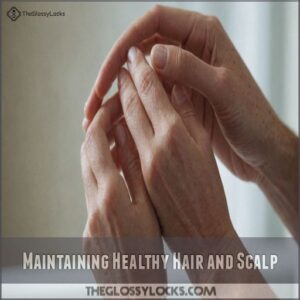This site is supported by our readers. We may earn a commission, at no cost to you, if you purchase through links.
 You’ve probably wondered how fast hair growth really is.
You’ve probably wondered how fast hair growth really is.
On average, your locks grow about half an inch per month, or six inches yearly.
Each strand sprouts from its own follicle, with the bulb at the base acting as a tiny hair factory.
But don’t get discouraged if you’re not seeing Rapunzel-like results overnight!
Your hair’s growth rate depends on factors like genetics, diet, and overall health.
While you can’t control everything, there are ways to give your hair a boost.
From scalp massages to nutrient-rich foods, you’ll be surprised at how simple tweaks can make a big difference.
Understanding the hair growth cycle, which includes four stages: anagen, catagen, telogen, and exogen, is key to promoting [faster hair growth techniques](https://theglossylocks.com/can-anything-speed-up-hair-growth/](https://theglossylocks.com/can-anything-speed-up-hair-growth/). Ready to learn more about faster hair growth?
Table Of Contents
- Key Takeaways
- Factors Affecting Hair Growth Rate
- Hair Growth Cycle and Phases
- How to Promote Hair Growth Naturally
- Methods to Speed Up Hair Growth
- Maintaining Healthy Hair and Scalp
- Frequently Asked Questions (FAQs)
- How fast does hair grow in a month?
- Does hair grow faster if it’s healthy?
- How fast does scalp hair grow?
- Can you speed up hair growth?
- How can I make my hair grow faster naturally?
- Do you have to use cold water after washing your hair, even if the weather is cold?
- What foods should I include in my diet to make my hair grow faster?
- Can hair grow 1 inch a month?
- Can I grow 2 inches of hair in a month?
- How fast can hair grow in a week?
- How can I speed up my hair growth?
- Does hair grow faster when cut regularly?
- Can certain hairstyles affect hair growth speed?
- Do hair growth vitamins actually work?
- Is there a difference in growth rate between ethnicities?
- How does hair dye impact growth rate?
- Conclusion
Key Takeaways
Here are 4 key takeaways about how fast hair grows:
- Your hair grows about half an inch per month on average, but this can vary based on genetics, diet, and overall health.
- You can’t dramatically speed up hair growth, but you can optimize it through proper nutrition, scalp care, and stress management.
- Regular trims don’t make your hair grow faster, but they help maintain its health by preventing split ends and breakage.
- While hair growth supplements may help, they’re not a miracle solution – focus on a balanced diet and healthy hair care practices for the best results.
Factors Affecting Hair Growth Rate
Your hair’s growth rate isn’t set in stone; it’s influenced by a variety of factors you can control.
From genetics to nutrition, understanding these elements can help you maximize your hair’s growth potential.
Key Market Trends
When it comes to hair growth, market trends are shaping how you care for your locks. Here’s what’s hot:
- Natural and organic products gaining traction
- Personalized hair care solutions on the rise
- Increased demand for multi-functional products
- Growing interest in traditional remedies and herbs
For those interested, cutting-edge tools like smart hairbrushes online are now available, which can help monitor and improve hair health.
Competitive Landscape Analysis
The hair growth market‘s a battlefield, folks.
Big brands are duking it out with innovative products, while smaller players carve out niches.
You’ve got your heavy hitters like Rogaine and Propecia, but don’t count out the natural remedy crew, all of which are still trying to beat the average hair growth rate of 0.5 to 1.7 centimeters per month average hair growth in a month.
Companies are racing to discover the secrets of faster hair growth, with some experts suggesting that gentle brushing techniques, such as those using a soft boar bristle brush for stimulating hair follicles, can play a role in promoting healthy locks, throwing everything from caffeine-infused shampoos to laser caps into the mix.
It’s a wild ride, and your scalp’s along for it.
Future Growth Opportunities
While the hair care industry evolves, exciting opportunities emerge.
You’ll soon see advanced hair growth technologies hitting the shelves.
These innovations target scalp health and tackle hair loss head-on.
Keep an eye out for personalized treatments based on your unique hair type and genetics.
Smart hair care devices and AI-powered diagnostics are also on the horizon.
With these breakthroughs, you’ll have more options than ever to boost your hair growth journey.
Hair Growth Cycle and Phases
Your hair’s growth journey is like a three-act play: anagen (growing), catagen (transitioning), and telogen (resting).
Understanding these phases can help you nurture your locks for the best growth, so you’ll be on your way to longer hair in no time.
Anagen Phase
Your hair’s growth journey kicks off with the anagen phase, where all the magic happens.
This active stage lasts anywhere from 2 to 7 years, determining how long your locks can grow.
Genetics play a big role in anagen phase duration, but factors like nutrition and stress can impact it too.
Understanding this phase helps you nurture your hair for the best possible growth potential.
Catagen Phase
After the active growth phase, your hair enters the catagen phase, a brief shift lasting about 2-3 weeks.
During this time, hair growth slows down as follicles shrink and detach from the blood supply.
You might notice some hair shedding, but don’t panic – it’s a normal part of the cycle.
Understanding this phase can help you better manage your hair care routine and expectations for growth.
Telogen Phase
During the telogen phase is a resting phase where hair follicles remain dormant for about 3 months. The telogen phase marks the end of your hair’s growth cycle.
During this resting period, your hair stops growing and prepares to shed.
It’s normal to lose 50-100 hairs daily in this phase.
But don’t panic!
This natural process makes way for new, healthy strands.
- Your scalp’s taking a well-deserved break
- Old hairs are making room for fresh growth
- It’s like your hair’s hitting the reset button
Understanding the telogen phase helps you manage expectations and care for your locks effectively.
How to Promote Hair Growth Naturally
You don’t need fancy products to boost hair growth – nature’s got your back.
With the right diet and care routine, you can give your locks the TLC they need to grow faster and stronger.
Balanced Diet
Moving from understanding your hair’s growth cycle to taking action, let’s talk about what’s on your plate.
Proper eating habits can make or break your hair growth journey.
By maintaining balanced meals throughout the day, you’re giving your body what it needs to build stronger, longer hair.
Think of your diet as the foundation – you wouldn’t build a house on shaky ground, right?
Essential Nutrients
Building on your healthy eating habits, specific nutrients work like building blocks for your hair.
Your body needs protein to construct new strands – think eggs, fish, and lean meats.
Iron carries oxygen to your follicles, while zinc helps repair and grow hair tissue.
You can also support your hair growth with supplements, such as those found in hair growth vitamins.
Not getting enough of these nutrients might slow down your hair growth or make it brittle.
These nutrients team up to give you the gorgeous hair you’re after.
Vitamins and Minerals
Your hair’s growth potential relies heavily on essential vitamins and minerals.
Biotin, vitamin D, and iron work together to strengthen hair follicles and promote healthy growth.
You’ll want to focus on B-complex vitamins for cell metabolism, zinc for protein synthesis, and vitamin C for collagen production.
If you’re not getting enough from food alone, consider supplements after consulting your healthcare provider.
Scalp Care
A healthy scalp is like fertile soil for growing strong hair.
While vitamins feed your hair from within, proper scalp care creates the perfect environment for growth.
Here’s what you need to know:
- Massage your scalp for 5 minutes daily to boost blood circulation
- Keep your scalp clean with gentle, sulfate-free shampoos
- Use a soft brush to remove dead skin cells without causing damage
These simple practices help transform your scalp into a happy growing ground.
Methods to Speed Up Hair Growth
You can boost your hair growth beyond its natural rate of half an inch per month with proven scientific methods.
Whether you’re looking to repair damaged locks or achieve longer hair faster, you’ll find effective techniques that combine topical treatments, scalp care, and innovative therapies to maximize your growth potential.
Topical Treatments
Effective topical treatments can transform your hair growth journey when applied consistently.
Here’s a quick guide to the most promising options:
| Treatment | How It Works | Expected Results |
|---|---|---|
| Minoxidil | Increases blood flow | Visible growth in 3-6 months |
| Essential oils | Stimulates follicles | Improved thickness in 2-4 months |
| Caffeine-infused products | Blocks DHT | Enhanced growth in 2-3 months |
Remember to patch test new treatments and be patient—most need at least eight weeks to show results.
Low-Level Laser Therapy
Low-level laser therapy (LLLT) has emerged as a science-backed solution for faster hair growth.
Research shows these FDA-cleared devices can wake up dormant follicles through painless light energy.
You can find a wide range of best hair growth lasers on the market.
While LLLT devices range from $200-800, they’re a one-time investment that’s safer than many alternatives.
Studies suggest 2-3 sessions per week can boost growth by up to 30% within six months.
Massage and Scalp Stimulation
Gently massaging your scalp stimulates blood flow to hair follicles, potentially speeding up growth while melting away stress.
Using turmeric for hair growth is believed to reduce inflammation and improve skin health, try incorporating it into your routine through methods for using turmeric for hair growth. Regular scalp massage can strengthen roots and promote healthier hair growth.
Here’s what scalp stimulation does for you:
- Increases blood circulation to feed hungry follicles
- Distributes natural oils for a healthier scalp environment
- Releases tension that can restrict hair growth
Consider it like watering a garden – your follicles need that nurturing touch to thrive.
Maintaining Healthy Hair and Scalp
Maintaining a healthy scalp is your secret weapon for faster hair growth.
You’ll want to start with gentle cleansing using sulfate-free shampoos that won’t strip your scalp’s natural oils.
To take it a step further, consider incorporating a regular scalp detox treatment at home to remove product buildup and promote a healthy environment for hair growth.
Keep heat styling to a minimum – your hair will thank you by staying stronger and breaking less.
Massage your scalp for 5 minutes daily to boost blood circulation and stimulate those follicles.
Don’t skip regular trims every 8-10 weeks to prevent split ends from traveling up the hair shaft.
When you’re sleeping, switch to a silk pillowcase to reduce friction and breakage.
Avoid tight hairstyles that can stress your scalp and lead to traction alopecia.
Remember, healthy hair starts at the root, so treat your scalp like the garden it is.
Frequently Asked Questions (FAQs)
How fast does hair grow in a month?
Your hair grows about 5 to 7 centimeters (2 to 7 inches) per month. That’s roughly the width of a pencil! Growth rates vary based on genetics, age, and health. Want to measure yours?
Does hair grow faster if it’s healthy?
Like a pampered garden, healthy hair thrives.
While genetics play a key role, nourishing your locks can boost growth.
You’ll see faster results with a balanced diet, proper care, and stress management.
It’s all about nurturing those follicles!
How fast does scalp hair grow?
Scalp hair typically grows about 5 inches (25 cm) per month, or 6 inches (15 cm) annually.
You’ll see roughly half an inch of new growth every 30 days, but individual rates can vary based on genetics and health.
Can you speed up hair growth?
While you can’t work miracles, you can give your locks a little boost.
A balanced diet, stress management, and proper hair care can potentially accelerate growth.
Some swear by supplements, but their effectiveness isn’t set in stone.
How can I make my hair grow faster naturally?
Want faster hair growth? Focus on nutrition.
Eat protein-rich foods, load up on vitamins, and stay hydrated.
Gentle scalp massages can boost circulation.
Remember, patience is key – hair typically grows about half an inch monthly.
Do you have to use cold water after washing your hair, even if the weather is cold?
Did you know 90% of hair stylists recommend a cold rinse?
You don’t need freezing water, even in cold weather.
A quick cool rinse seals the cuticle, boosting shine.
If it’s chilly, just lower the temp slightly.
What foods should I include in my diet to make my hair grow faster?
Load up on protein-rich foods like eggs, fish, and lean meats.
Don’t forget nuts, seeds, and leafy greens for essential vitamins.
Avocados and berries pack a punch too.
Your hair will thank you for this nutrient boost!
Can hair grow 1 inch a month?
Imagine this: your hair, growing like a weed!
While it’s possible, it’s not typical.
Hair usually grows about 5 inches per month.
Your genetics, diet, and overall health play a big role in your hair’s growth rate.
Can I grow 2 inches of hair in a month?
Growing 2 inches of hair in a month isn’t realistic.
Your hair typically grows about 5 inches per month.
While you can’t speed it up dramatically, and incorporating Ayurvedic approaches to hair growth like balancing Vata dosha can help treat underlying imbalances, maintaining a healthy lifestyle and proper hair care can optimize your natural growth rate.
How fast can hair grow in a week?
Hair typically grows about 1/8 to 1/4 inch per week.
You’ll see roughly 35 to 5 cm of growth in seven days.
It’s a slow process, but consistent care can help you maximize your hair’s potential.
How can I speed up my hair growth?
Did you know hair grows about 5 inches per month?
To speed it up, focus on nutrition.
Eat protein-rich foods, take biotin supplements, and reduce stress.
Gentle scalp massages and avoiding heat styling can also help boost growth.
Does hair grow faster when cut regularly?
Unfortunately, regularly cutting your hair doesn’t actually make it grow faster.
It’s a common myth.
Your hair growth rate is determined by genetics and health factors.
Trimming just keeps your hair looking neat and healthy.
Can certain hairstyles affect hair growth speed?
While hairstyles don’t directly affect growth speed, certain styles can impact hair health.
Tight ponytails or braids may cause traction alopecia, slowing apparent growth.
Opt for looser styles to minimize stress on your follicles and promote healthier growth.
Do hair growth vitamins actually work?
Imagine your hair as a garden – vitamins are like fertilizer.
They can nourish the soil, but they can’t make plants sprout overnight.
Hair growth vitamins might help, but don’t expect miracles.
Results vary and depend on your overall health.
Is there a difference in growth rate between ethnicities?
Yes, there’s a notable difference in hair growth rates among ethnicities.
Asian hair tends to grow fastest at about 8 inches per month, while African hair grows slower at around 2 inches.
European hair falls in between these rates.
How does hair dye impact growth rate?
Hair dye doesn’t directly affect your hair’s growth rate.
It can, however, damage your hair if used frequently or improperly.
This damage might make your hair appear to grow slower, as it’s more prone to breakage and split ends.
Conclusion
Growing luscious locks is like tending a garden – it takes time and care.
Remember, how fast hair growth occurs depends on various factors, but with these tricks, you’re well on your way to longer tresses.
Stick to a balanced diet, pamper your scalp, and stay patient.
While incorporating natural remedies like rosemary oil for hair growth into your routine, which has been shown to stimulate follicles with its circulation-boosting properties circulation-boosting properties, can help maximize your natural growth potential.
Keep at it, and before you know it, you’ll be turning heads with your enviable mane.
Here’s to healthier, longer hair!

